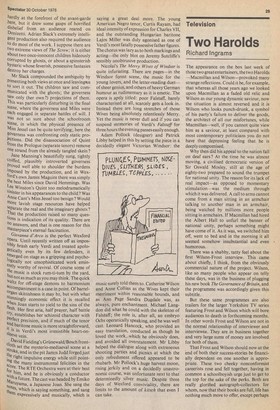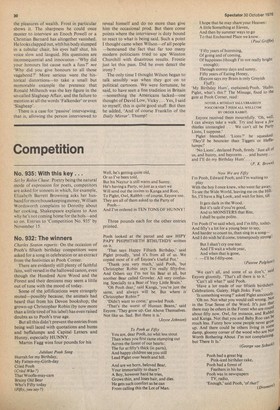Television
Two Harolds
Richard Ingrams
The appearance on the box last week of those two great entertainers, the two Harolds —Macmillan and Wilson—provoked many strange reflections. Could it be, for example, that whereas all those years ago we looked upon Macmillan as a faded old relic and Wilson as our young dynamic saviour, now the situation is almost reversed and it is Wilson who looks punch-drunk, a symbol of his party's failure to deliver the goods, the architect of all our misfortunes, while Macmillan—well, if you cannot quite view him as a saviour, at least compared with most contemporary politicians you do not have that depressing feeling that he is deeply compomised.
• Why then did his appeal to the nation fall on deaf ears? At the time he was almost moving, a civilised democratic version of Sir Oswald Mosley, still at the age of eighty-two prepared to sound the trumpet for national unity. The reason for its lack of real impact—as opposed to Momentary stimulation—was the medium through which it was delivered. A call to arms cannot come from a man sitting in an armchair talking to another man in an armchair, being 'watched by millions more people sitting in armchairs. If Macmillan had hired the Albert Hall to unfurl the banner of national unity, perhaps something might have come of it. As it was, we switched him off, went to bed and in the morning it all seemed somehow insubstantial and even humorous.
There was a shabby, tatty feel about the first Wilson-Frost interview. This came about chiefly, I think, from the obviously commercial nature of the project. Wilson, like so many people who appear on telly these days, was in the business of plugging his new book The Governance of Britain, and the programme was accordingly given this subtitle.
But these same programmes are also trailers for the larger Yorkshire TV series featuring Frost and Wilson which will bore audiences to death in forthcoming months. In other words Frost and Wilson are not in the normal relationship of interviewer and interviewee. They are in business together and very large sums of money are involved for both of them.
That Frost and Wilson should now at the end of both their success-stories be financially dependent on one another is appropriate. These two cheeky nonconformist careerists rose and fell together, having in common a schoolboyish urge just to get to the top for the sake of the perks. Both are really glorified autograph-collectors for whom, now that their books are full, life has nothing much more to offer, except perhaps
the pleasures of wealth. Frost in particular shows it. The sharpness he could once muster to interview an Enoch Powell or a Christian Barnard has altogether vanished. He looks clapped out, with his body slumped in a tubular chair, his eyes half shut, his voice slow and languid. His questions are inconsequential and innocuous—'Why did your honours list cause such a fuss?' not 'Why did you give honours to all those vagabond?' More serious were the historical distortions—to take a small but memorable example the pretence that Ronald Milhench was the key figure in the so-called Slagheap Affair, and the failure to mention at all the words 'Falkender' or even 'Slagheap'.
There is a case for 'passive' interviewing, that is, allowing the person interviewed to reveal himself and do no more than give him the occasional prod. But there come points where the interviewer is duty bound to react to what is being said. Such a point I thought came when Wilson—of all people —bemoaned the fact that far too many modern politicians tried to ape Winston Churchill with disastrous results. Frostie just let this pass. Did he even detect the irony?
The only time I thought Wilson began to talk sensibly was when they got on to political cartoons. We were fortunate, he said, to have seen a fine tradition in Britain —something the Americans lacked—one thought of David Low, Vicky. ... Yes, I said to myself, this is quite good stuff. But then he added, 'And of course Franklin of the Daily Mirror'. Thump!



































 Previous page
Previous page